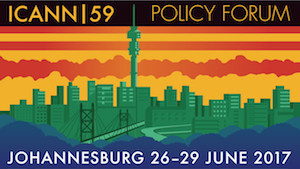GNSO: Non-commercial users constituency (NCUC) policy session
3 Jul 2017 02:00h
Event report
Mr Farell Folly (Non-Commercial Stakeholder Group (NCSG)) presented the initiative of a frequently asked questions (FAQ) document for newcomers. The document would include basic definitions to help new members familiarise themselves with the terms, acronyms, and the structure of ICANN. He announced that a first draft with 10 questions to help newcomers would be ready within a month.
Mr Ayden Férdeline (Policy Committee, NCSG) reminded him that Ms Louise Marie Hurel (researcher at the Nucleus for Context Analysis in Brazilian Naval War College’s Center for Strategic and Political Studies, and NCUC) and Ms Kathy Kleiman (Internet Counsel, Fletcher, Heald & Hildreth, PLC, and NCUC) were also producing related materials for newcomers through the Community Onboarding Program, and called for shared synergies.
Ms Bruna Martins dos Santos (Independent consultant in Human Rights and Internet Affairs, Internet Governance Caucus Co-coordinator, NCUC) presented a review of the issue of geographical top-level domain names. She stressed the difference between geographical domains and 2-letter country codes, highlighting the provisions of the New gTLD Program Applicant Guidebook (AGB) regarding country and territory names, and geographic names. She pointed out concerns raised by the Governmental Advisory Committee (GAC) and Country Code Names Supporting Organisation (ccNSO), who argue that the registration of 2-letter domain names could clash with country codes. She also explained that geographic names as TLDs are currently permitted only under the demonstrated support of the government who holds a relationship with it. She finished by suggesting that the issue be more broadly discussed and promoted through a series of discussing articles in blogs and debates at ICANN meetings about community empowerment through the use of geographical domain names. Kleiman noted that if requesting a domain name which aims to criticise or protest against an undemocratic government, has to go through this very government approval, this presents a massive freedom of expression issue.
Mr Elliot Noss (CEO, Tucows) explained that a Cross-Community Working Group is currently establishing procedures by which money from the new gTLD auction proceeds will be allocated. He mentioned that the auction could amount to more than 100 000 000 USD$, and that three things about the issue were most important to the NCUC. First, understanding that the hardest part is figuring out what kind of projects qualify for a legitimate application. Second, anything ICANN does out of its narrow scope could lead to losing its nonprofit status in California, and for this reason the scope of the proposals would probably be construed narrowly to something that deals specifically with DNS, names, and numbers. And finally, that local presence from the underserved communities which would benefit from the funds was necessary, although not yet felt or heard during the process.
Mr Tim Smith (General Manager Canadian International Pharmacy Association) complained that the new TLD .pharmacy which was launched with the aim of distinguishing legitimate from rogue pharmacy businesses around the world, was implemented using exclusionary, anti-competitive criteria, which are impossible for anyone outside of the USA to meet. He said that the objective of the move is to lead to distrust for anyone not using .pharmacy, and that discriminatory practices set a bad precedent for future rounds of TLDs. He mentioned that at the last RightsCon meeting, a panel was held following the establishment of a working team which came up with a draft document (Brussels Principles for safe online pharmacy dispensing), reinforcing access to essential medicines as a human right, and hopes that the initiative is a blueprint for how the issue can be handled around the world.
Ms Brian Schilling (ICANN Director for Consumer Safeguards) introduced himself and said the new function he is introducing will have him look at ICANN’s scope to address abuse issues. Schilling said that a working group is being formed through which the community will decide the structure, priorities, and ways forward of the role.
Mr Jonathan Zuck (Chair, Consumer Choice, Consumer Trust Review Team (CCT-RT)) mentioned that there is no pressing need to expand new rounds of generic top-level domain before addressing the recommendations his team propose in their review. He said that preliminary recommendations issued by the group might have been vague because they felt an intervention was necessary to anticipate whether safeguards would be efficient and attempt to mitigate negative effects, and that was done before they obtained the data they currently have, which will lead to a re-evaluation of some of the recommendations.
Related topics
Related event

